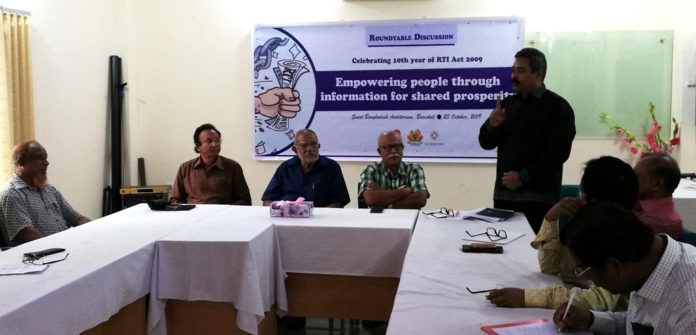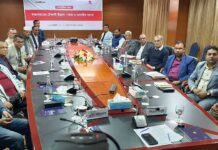Barisal, 23 October 2019. Public involvement is a must to ensure the success of the government’s development efforts and to ensure sustainable development. Free flow of information is one of the most effective means of ensuring public involvement in the development process. Therefore, effective implementation of the Right to Information Act 2009 is a must for sustainable development. Speakers expressed this opinion at a roundtable discussion held in Barisal on the occasion of the celebration of 10 years of the RTI Act-2009. The roundtable discussion was organized by COAST Trust at the Saint Bangladesh Auditorium. Manusher Jonno Foundation provided support for the event.
The roundtable was moderated by the Mostafa Kamal Akand, Deputy Director of COAST Trust. Among others Israt Jahan Lovely, Barisal City Corporation Councilor, Rehana Rehman Yasmin, Executive Director of Satata Development, Shubhankar Chakraborty, Executive Director of MAP Barisal, James P Biswas, Deputy Executive Director of BDS Barisal, Ranjith Dutta, District Coordinator of Steps Towards Development, Maqbool Hussain, Barisal Metropolitan correspondent of Bangladesh Betar, Kazi Jahangir Kabir, Executive Director of Saint Bangladesh, Anwar Zahid, Divisional president of BD CSO_NGO Coordination Process, Human rights activist Syed Habibur Rahman, ATM Khorshed Alam, Executive Director of Arohi, Freedom Fighter Mohiuddin Manik Bir Pratik, Abul Kalam Azad, President of the Barisal Metropolitan Press Club, Gopal Sarker, President of the , President Barisal Journalist Union, Monirul Islam, Area Manager of TIB, Barisal City Corporation Councilor Anisur Rahman and Upazila Education Officer Jahangir Hossain.
Mostafa Kamal Akand said that the RTI Act 2009 is a rare form of law, that can be used as a powerful tool for mass people to enforce human rights. According to a recent report, under this law, on average 7000 applications are being submitted. Due to various reasons, the number of requests for information is decreasing. In order to increase this, to ensure the free flow of information government officials and also while the common people have to be made more aware.
Anwar Zahid said that the Right to Information Act has created opportunities for getting information, while others have created some hostility in this regard. If the adversities are not removed, the law will not bring benefit.
Abul Kalam Azad said the digital security law needs amendments to ensure public participation in the development process through the Right to Information Act. While we want to use the RTI act to seek information, many people scare us with the digital security law!
Shubhankar Chakraborty said We have to come out of our long-standing culture of keeping information secret or not to give information. And for this, the initiative must be taken by both the public and private parties.
Md. Monirul Islam said that it is often difficult to find information officers in government offices, in many cases new information is not recruited even six months after an officer has been transferred. This issue needs to be addressed. The name of the officer is required to be displayed at each office.
Gopal Sarkar said, to ensure sustainable development, grassroots people have to give an idea about the power of information. In this case, the Union Parishad, Union Digital Center can play an important role. But due to various limitations, digital centers are not able to provide desired services. Adequate financial allocation is required for the centers.
Md. Jahangir Hossain said, “The government is urging us to give information, we are also enthusiastic about this. Many times due to lack of manpower we may have some problems in giving information.
Please download press release [Bangla Press Release] [English Press Release]
Photos
Newspaper:












